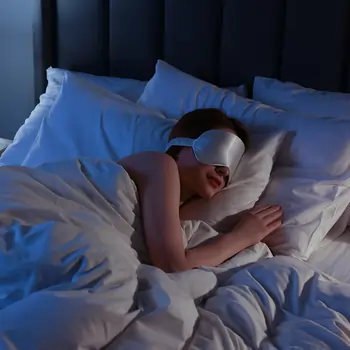What Causes Insomnia? Everything You Need to Know
Sleep disorders currently affect more than 50 million people in the United States.
Although there are more than 80 different sleep disorders, the most common ones include:
Restless legs syndrome
Jet lag
Narcolepsy
Insomnia
These sleep disorders affect the quality, quantity, and timing of the sleep that you get at night, meaning that people with a disorder will struggle to fall asleep and stay asleep throughout the night.
The most common sleep disorder is insomnia, with 30% of adults reporting symptoms of the condition.
Tired of restless nights?
Don’t let insomnia hold you back. Take the first step towards better sleep with LifeMD.


What is Insomnia?
Insomnia is a condition where the sleep-wake cycle is abnormal, which can cause both mental and physical health problems.
People with insomnia don’t get enough sleep to feel refreshed when they wake up, which can cause them to feel sleepy throughout the day. This is called hypersomnia and can be caused by other sleep disorders.
The sleep deprivation associated with insomnia is known for its connection with cardiovascular disease, high blood pressure, kidney problems, and obesity.
Risk factors for developing insomnia
Some people are at a higher risk for developing insomnia because of a variety of factors.
Risk factor | Explanation |
|---|---|
Age | The older we get, the higher the chances are that we will develop insomnia. |
Family history | People with relatives who have insomnia are more likely to experience the condition themselves. |
Sex | Women, especially menopausal women, are more likely to have insomnia than men. |
Lifestyle | Poor sleep habits such as daytime napping, caffeine consumption, and having an irregular sleep schedule can contribute to insomnia. |
Having a mental health condition | Those with a mental health condition are predisposed to experiencing insomnia. |
Socioeconomic status | Individuals who live in poorer areas are known to be at a higher risk of insomnia. This is often due to a lack of medical assistance and potential stress. |
The main symptoms of insomnia
If you are experiencing any of the below symptoms, you may have insomnia.
It’s important to see a medical professional who can properly diagnose and treat this condition based on your symptoms, which may include:
Trouble falling asleep at bedtime
Difficulty staying asleep throughout the night
Waking up often during the night
Waking up earlier than necessary
Daytime sleepiness and fatigue
Impaired cognitive functioning, like difficulty concentrating
Mental health problems such as depression and anxiety
Primary and Secondary Insomnia: What’s the Difference?
Primary insomnia is characterized by trouble sleeping without an underlying cause, like a medical or psychiatric condition.
On the other hand, secondary insomnia involves having an underlying condition that causes sleep problems.
Here are the main differences between primary and secondary insomnia:
Key differences | Primary insomnia | Secondary insomnia |
Cause | Often there is no identifiable cause. It is usually related to lifestyle factors and stress. | An underlying medical condition, mental disorders, substance abuse, medication side effects, or environmental factors. |
Onset of sleep problems | Symptoms appear gradually. | Symptoms start suddenly. |
Duration | Usually, short-term insomnia lasts less than three months. | Typically resolves when the underlying condition is treated or managed. |
Sleep patterns | Difficulty falling asleep and staying asleep. People may also wake up too early. | Disturbances caused by an underlying condition, such as pain disrupting sleep or sleep apnea, cause awakenings. |
Treatment | Practicing proper sleep hygiene, cognitive behavioral therapy (CBT), relaxation techniques, and medications. | Management of the underlying cause is typically the first line of treatment, followed by medications. |
The Main Causes of Insomnia
Stressors and psychological factors
One of the most common causes of insomnia is stress and worry. This can be caused by significant life changes like:
Divorce
The death of a loved one
Relocation
They can also be caused by school or work-related stress. Concerns like this can keep your mind active at night, making it difficult to fall asleep.
Neurological disorders
Disorders that affect the brain, like dementia, Alzheimer’s disease, and attention-deficit hyperactivity disorder (ADHD), can interrupt something called the circadian rhythm, which is a natural cycle that we go through every 24 hours that includes sleep.
ADHD can cause hyperarousal, making it hard for people with this neurodevelopmental disorder to get restorative sleep.
Travel or changes in your schedule
Traveling across multiple time zones, suffering from jet lag, working shifts that are late or early in the morning, or frequently changing shifts can affect sleep.
This is because the body’s circadian rhythm is interrupted, making it difficult to get proper sleep.
Consuming stimulants too close to bedtime
The caffeine found in coffee, soft drinks, and even tea is a stimulant. Drinking caffeinated beverages in the afternoon or evening can prevent you from being able to fall and stay asleep at night.
Another stimulant that causes people to struggle with sleep is the nicotine found in tobacco products.
Lastly, it may feel like alcohol helps you fall asleep. However, it may prevent deep and restful sleep, often causing people to wake up regularly at night.
Poor sleep hygiene and lifestyle choices
Poor sleep habits can make it harder to fall and stay asleep during the night. Some sleep habits that may reduce the quality of rest you are getting include:
Eating large meals before bed
Daytime napping
An irregular bedtime
Using electronic devices such as smartphones and TVs before bed
Using your bed for activities such as work
It’s important to practice good sleep hygiene if you want to improve your sleep quality.
Environmental factors
The environment in and around your bedroom can interrupt sleep. For example, noise and light pollution can make it challenging to get proper rest.
The temperature of the room you sleep in can also affect your body’s ability to get quality sleep.
Mental health conditions
Having a mental health condition can significantly affect your sleep. For example, an anxiety condition such as post-traumatic stress disorder (PTSD) can cause sleep problems.
Waking up very early in the morning can be a symptom of depression. It’s worth noting that insomnia can also lead to the development of mental health problems.
A sedentary lifestyle
Regular exercise plays a large role in being able to get a decent amount of quality sleep.
People who are not physically active and who lead a sedentary lifestyle may struggle with sleep efficiency.
Pre-existing medical conditions
Other than mental health disorders, certain other medical conditions are linked with insomnia. Some of these conditions include:
Chronic pain
Respiratory disorders like asthma
Diabetes
An overactive thyroid, knowns as hyperthyroidism
Substance use and withdrawal
As mentioned above, alcohol use can significantly impact your sleep cycle.
Excessive alcohol consumption or the use of recreational drugs can notably impact sleep quality. Withdrawal from these substances can also influence how well you sleep.
Withdrawal from certain medications, like sedatives or sleeping pills, can cause rebound insomnia, which is insomnia that occurs after stopping drugs that help you sleep.
Other sleep disorders
Insomnia is often caused by other sleep disorders, which can make it almost impossible to get a good night’s sleep. These include
Sleep apnea: People with obstructive sleep apnea, in particular, may stop breathing during the night, disrupting their sleep.
Restless legs syndrome: A disorder that causes uncomfortable sensations in the legs and results in an irrational need to move them, preventing people from falling asleep.
Parasomnia: These are abnormal sleep behaviors that include sleepwalking, night terrors, and sleep paralysis.
Some medications
Certain prescription medications can interfere with sleep. These include:
Some antidepressants
Asthma medicine
High blood pressure medications
Many over-the-counter (OTC) drugs can also disrupt sleep as they often contain stimulants like caffeine, such as:
Pain relievers
Allergy and cold medications
Weight loss products
Age-related changes
Depending on their age group, certain people have a higher chance of experiencing insomnia.
Older adults
Up to 48% of older adults experience insomnia. As adults grow older, they experience certain changes that can result in sleeping difficulties. These include changes in:
Sleep patterns: Sleep can become less restful for older adults. Their internal clock also often changes, which can lead to feeling sleepy earlier and waking up early in the morning.
Health: As people age, they are more likely to develop conditions that lead to chronic pain and mental health problems that can disrupt sleep.
Activity levels: Older adults may be less physically active, which can interfere with sleep. As discussed earlier, regular exercise is essential for good sleep.
Plus, older adults typically use more medications than younger individuals. This increases their risk of developing insomnia associated with drugs.
Teenagers
Almost 23% of teenagers will experience insomnia. The changes that occur in the body during adolescence can disrupt the sleep schedule, resulting in them falling asleep much later than in earlier years.
Other factors that may interrupt sleep for teenagers include:
Early school start times
Overscheduling and stress related to school activities
High rates of electronic device usage in the sleep environment
Pregnancy
During pregnancy, women experience a host of physical changes that can result in reduced sleep quality.
For example, their increased weight may cause pain and discomfort, making it difficult to fall and stay asleep throughout the night.
Pregnant women may also experience nocturia, which refers to frequent nighttime urination. Having to get up and use the bathroom during the night can be significantly disruptive to sleep.
Treating Insomnia: When to Get Medical Help
If your symptoms last longer than 4 weeks, it is recommended that you see a healthcare professional about insomnia.
If your lack of sleep affects your ability to function normally and perform daily activities, seeking treatment is also important.
Where Can I Learn More About Insomnia?
Through LifeMD, you can consult a board-certified physician or nurse practitioner to diagnose and treat insomnia.
Our healthcare providers can also give you advice on developing healthy sleeping habits and good sleep hygiene practices.
Don’t let insomnia control your nights. LifeMD-affiliated physicians can prescribe FDA-approved, non-addictive medications to help you fall asleep faster. Start your treatment today.














